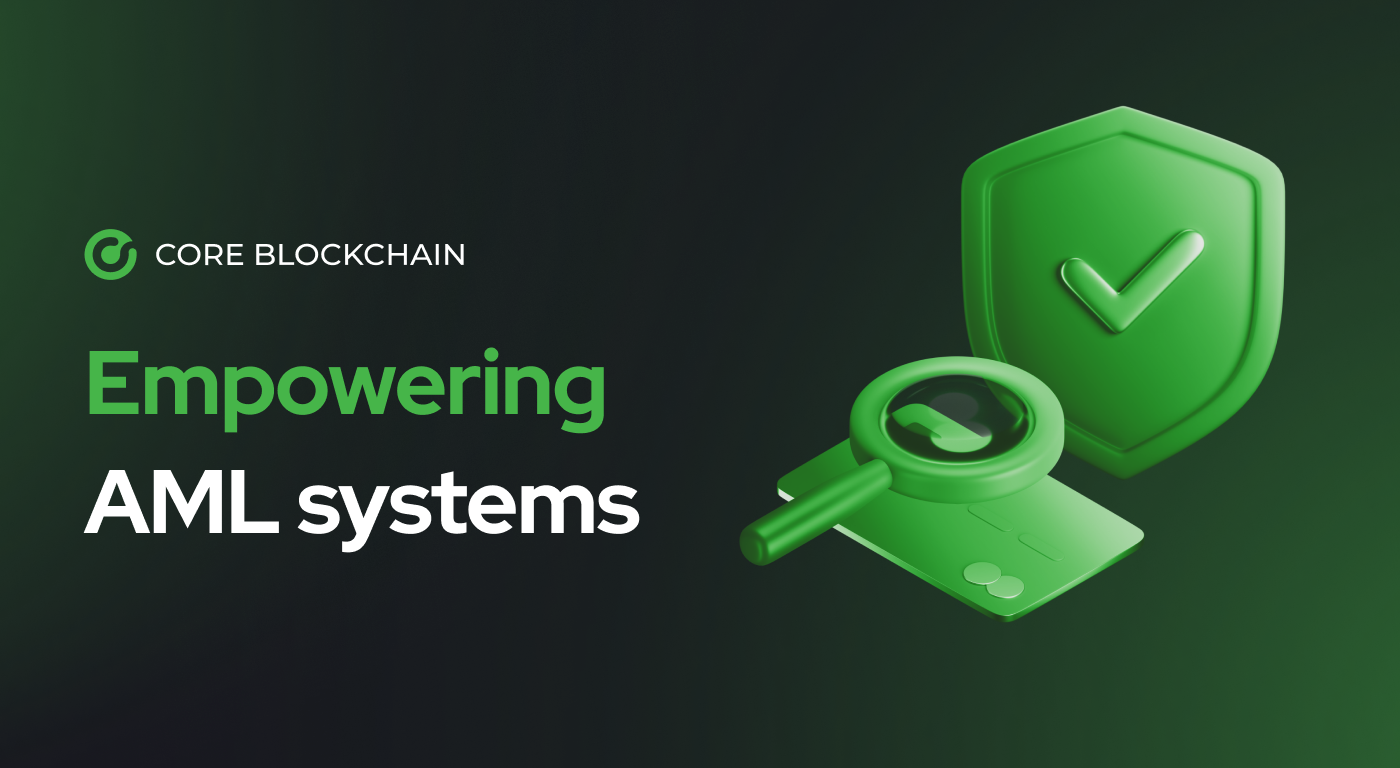Empowering AML systems

Anti-Money Laundering (AML) and Combating The Financing of Terrorism (CFT) systems have set a standard in money transfer regulation, but the recent updates to the goAML system, named goAML 5.0, are crucial when it comes to the regulation of cryptocurrencies.
Core Blockchain developers embraced the new regulatory changes, quickly becoming the first to support goAML 5.0 with an open-source library that connects regulatory frameworks with Core Blockchain’s networks.
goAML 5.0 Comes With Advanced Technologies and Cryptocurrency Support
goAML 5.0 is the newest regulatory update to the well-established goAML compliance platform introduced by the UNODC. It is designed to help countries and their FIUs combat money laundering, fraud, and terrorist financing by allowing them to collect, analyze, and share financial information related to suspicious activities.
One of the most notable features of goAML 5.0 is cryptocurrency support, which makes it possible to report and process transactions involving digital currencies. It also comes with Artificial Intelligence features such as Natural Language Processing (NLP) and Optical Character Recognition (OCR), expanded reporting capabilities, Egmont secure web integration, and an even more accessible user interface.
Core Blockchain Becomes The First Network to Respond to the goAML 5.0 Initiative
Core Blockchain sets a new standard in Anti-Money Laundering (AML) systems by developing the first Oracle to support the goAML 5.0 initiative. Core Laboratories has published an open-source library called XmlGoaml, which is the only repository in the goAML topics on GitHub so far.
XmlGoaml
XmlGoaml is a .NET project designed for processing XML data with advanced validation against XSD schemas, specifically targeting reports related to financial intelligence and suspicious activity reporting, aligned with the goAML standards under the Core License.
Features
- XML Generation: Generate XML files from your parameters.
- XML Validation: Validate XML against a provided XSD schema. (You need to connect the XSD schema.)
Core Blockchain’s Compliance Ecosystem
Core Blockchain is positioned to handle the transmission of sensitive financial information, ensuring full compliance and security. Here’s why:
It guarantees that all data transmitted across its network is secure
Core Blockchain’s decentralized network and advanced cryptographic security prevent unauthorized access and tampering with data, making it a reliable solution for AML compliance. This ensures all data remains secure and immutable at all times.
It uses an improved PoW system
Core Blockchain developed an improved Proof-of-Work (PoW) system, called Proof-of-Distributed–Efficiency. PoDE reworks the original PoW system while addressing and minimizing the environmental concerns posed by traditional PoW systems.
It ensures rapid transaction and verification of transactions
With transaction verification occurring approximately every seven seconds, Core Blockchain ensures the rapid transmission of financial data without compromising security, making it a leader in both speed and reliability.
It allows data changes without any internet connection
Core Blockchain's 0G (SMS, MMS) connectivity allows it to transmit data even in areas without network connectivity. This feature ensures critical financial data can be transmitted securely, regardless of infrastructure limitations.
It bridges the gap between traditional financial systems
Core Blockchain’s oracles bridge the gap between traditional financial systems and blockchain technology, enabling integration with compliance tools like the XmlGoaml Oracle.
It offers an ecosystem of innovative, AML-compliant Dapps
With decentralized Layer-1 applications like CorePass, Core Blockchain adds another layer of security and compliance to the AML process. CorePass is a peer-to-peer decentralized digital ID & login app that allows you to digitize and utilize your government-issued documents. CorePass leverages digital identity attributes in an integrated, frictionless and multi-layered environment built on the Core Blockchain Network, making it possible to verify your data and use it to access applications/services that use CorePass. It is the world's most advanced and fully GDPR-compliant digital identity platform, with monetizable sharing of verified data on a need-to-know basis.
The Most Advanced Blockchain Compliance Ecosystem To Date
The integration of Core Blockchain and CorePass with Oracles connected to goAML 5.0 creates a robust compliance ecosystem that meets the highest standards of security, transparency, and efficiency.
Core Blockchain ensures that all data exchanged within the XmlGoaml system is secure and resistant to tampering.
XmlGoaml is a .NET project designed to process XML data that is aligned with goAML XSD standards. This tool enables seamless integration between Core Blockchain and the goAML environment, ensuring compliance with global AML regulations.
CorePass provides verified, user-consented information, enhancing the accuracy and reliability of KYC, KYCC, and KYB processes, ensuring thorough identity verification and fraud prevention.
Designed for international use, Core Blockchain is able to adapt to the shifting regulatory landscape, making it a versatile compliance solution for financial institutions worldwide.
The Future of AML
The financial system and its protective measures have gradually been transforming with a prominent focus on digital currencies, programmable tokens, and FIAT bridges. As this trend continues, it becomes increasingly important to have a decentralized, PoW blockchain that aims to keep up with these changes and all the regulatory measures that come with them.
Core Blockchain's decentralized architecture and CorePass's verified information system offer an unparalleled level of security, efficiency, and on-demand compliance. Our constant commitment to adhere to all relevant regulations and laws means all data on our blockchain remains safe and fully decentralized and will continue to do so as new regulatory frameworks emerge.